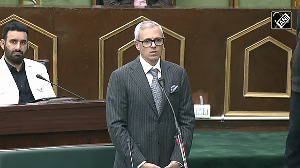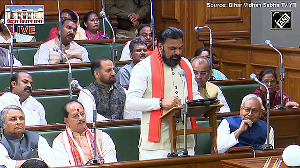Chelsea striker Adrian Mutu admitted testing positive for cocaine and will not ask for his 'B' sample to be analysed, English players' union chief Gordon Taylor said on Tuesday.
Mutu's agent Giovani Becali told Reuters in Bucharest that the Romania striker's test had been carried out on October 1 at the request of new Chelsea coach Jose Mourinho.
| |||||||||||
"He's accepted that he did test positive for cocaine ... and so we've got to deal with it under the social drugs procedure that we have in line with the FA."
Another of Mutu's agents Gheorghe Popescu told Reuters on Monday he had been informed by Chelsea of a positive test for a drug that was not performance-enhancing and said Mutu had been "destroyed" by the news.
Becali said Mourinho had asked for Mutu to be tested after a Champions League game in September.
"Mourinho asked for the test after Mutu failed to show up at training soon after the match against Paris Saint Germain, when Mutu was not called (off the bench)," Becali told Reuters.
"The test was held on October 1. I think Mourinho's decision followed Mutu's bizarre attitude.
MUTU'S RECORD
"Mourinho was fair when he called me to clarify Mutu's file which (former coach) Claudio Ranieri handed to the Portuguese," Becali said.
"There were there a lot of bad things about Mutu. I tried to make Mutu look better but I failed to persuade Mourinho."
Mourinho took over at Chelsea, run by Russian billionaire Roman Abramovich, in the close season after winning the Champions League with Porto.
Mutu's case comes a year after Chelsea sacked their Australian goalkeeper Mark Bosnich for testing positive for cocaine. The player also picked up a nine-month FA ban.
Taylor said: "It is possible for a club to have one of their players tested if they feel there is such problems.
"With Mark Bosnich, he wasn't in the first team and they did then take the opportunity to cancel the contract...Adrian Mutu cost 15 million pounds ($26.91 million) and that's a great deal of money to write off.
"I would hope, bearing in mind that investment, that they've as much interest in getting the player right and back on track as the player has himself -- and we have."
As for disciplinary proceedings, Taylor said: "We have a distinction between social drugs and those which are performance-enhancing. If the player accepts he is guilty and is prepared to undertake rehabilitation, to be checked regularly, to be clean, there is great sympathy towards the player."
"WADA, the world anti-doping agency, is reluctant to have such a distinction though, so that may well create a problem."
Under WADA's doping regime brought in this year, a two-year ban is imposed for positive drugs tests in any sport.








 © 2025
© 2025